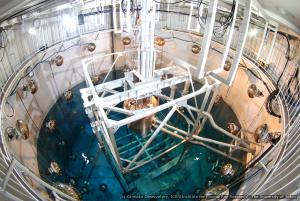Sep 9 2015
An experiment to test whether dark matter signals change throughout the year has found contradicting results to a previous experiment, announced an international team of researchers at the TAUP2015 conference in Italy this week.
 XMASS: Experimental setup of the XMASS at the Kamioka Observatory (credit: Kamioka Observatory, ICRR (Institute for Cosmic Ray Research), The University of Tokyo).
XMASS: Experimental setup of the XMASS at the Kamioka Observatory (credit: Kamioka Observatory, ICRR (Institute for Cosmic Ray Research), The University of Tokyo).
There is strong evidence that dark matter exists in our universe, but no one has ever detected it. Among many candidates, it is thought to be some sort of particle, with the best candidate to date being a WIMP (Weakly Interacting Massive Particle). Positive results have already been reported in the past by the DAMA/LIBRA experiment in Italy, which had found evidence a dark matter signal modulated with a period of one year.
The XMASS (Xenon detector for weakly interacting MASSive particles) experiment in Kamioka, Japan, involving Kavli IPMU (Kavli Institute for the Physics and Mathematics of the Universe) Project Professor Yoichiro Suzuki, spent 16 months taking data using the XMASS detector. A dark matter model independent analysis found a weak modulation effect, but researchers say this could be explained by background fluctuation. In the model dependent analysis assuming standard WIMPs, researchers constrained the deposited energy spectrum to the expected WIMP recoil signal, but found their results differed significantly from those found in the DAMA/LIBRA experiment.
This is the first extensive search exploiting the annual modulation caused by the earth’s rotation around the sun.
In order to reduce systematic uncertainty and improve the XMASS result, the researchers will continue to take more data.